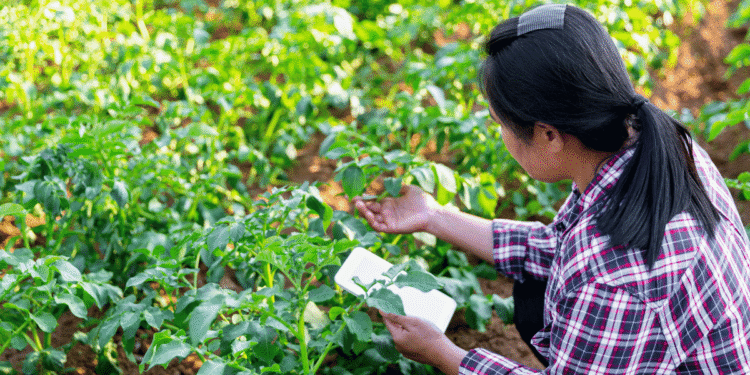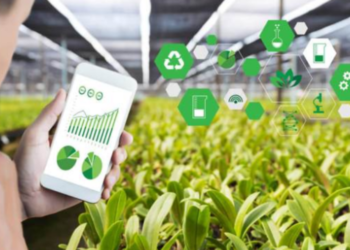Agriculture has been a major source of food production for thousands of years, but with the advent of new technologies, the way we farm is rapidly changing. Precision agriculture is one such technology that is transforming the way farmers produce crops. Precision agriculture involves the use of advanced technologies and data analysis to improve crop yields and reduce waste.
What is Precision Agriculture?

Precision agriculture is an innovative approach to farming that uses advanced technologies such as GPS, remote sensing, and data analytics to gather, process, and analyze information about crop growth, soil conditions, and weather patterns.
This information is then used to optimize crop production and make informed decisions about planting, fertilization, and pest control. The goal of precision agriculture is to increase crop yields, reduce waste, and minimize the environmental impact of farming.
The Benefits of Precision Agriculture:
Precision agriculture is a modern farming practice that leverages technology and data to optimize crop production and increase efficiency. This approach offers many benefits over traditional farming methods, including:
- Increased Yields: Precision agriculture allows farmers to target specific areas of their fields that need attention, reducing waste and increasing yields. This is achieved through the use of sensors, mapping technology, and precision machinery that can deliver inputs like seeds, fertilizer, and water with greater accuracy.
- Lower Input Costs: Precision agriculture helps farmers make more informed decisions about which inputs to use and when to use them. This leads to a reduction in input costs, as farmers can avoid over-applying fertilizer, pesticides, and water, and reduce the risk of crop damage.
- Improved Soil Health: Precision agriculture can help farmers better understand the condition of their soil, including pH levels, nutrient levels, and water-holding capacity. This information can be used to develop specific soil management plans, reducing the need for synthetic inputs and improving soil health.
- Better Resource Management: Precision agriculture makes it possible to track inputs and outputs in real-time, allowing farmers to make more informed decisions about water use, energy consumption, and land management. This can lead to more efficient resource use and a reduction in environmental impact.
- Increased Profitability: By reducing inputs, improving yields, and making more informed decisions, precision agriculture can lead to increased profitability for farmers. This is achieved by reducing waste and improving the efficiency of resource use, as well as by increasing yields and reducing production costs.
The Future of Precision Agriculture:
The future of precision agriculture is bright, with many new technologies and innovations on the horizon. As the use of precision agriculture continues to grow, farmers will have access to more advanced technologies and data analysis tools that will help them to optimize crop production and reduce waste. Additionally, precision agriculture will play a critical role in meeting the increasing demand for food as the global population continues to grow.
Data-Driven Farming:
Data-driven farming is an integral component of precision agriculture. By gathering and analyzing large amounts of data about crop growth, soil conditions, and weather patterns, farmers can make more informed decisions about how to optimize crop production. This data-driven approach helps farmers to make informed decisions about planting, fertilization, and pest control, which results in increased crop yields, reduced waste, and greater efficiency.
Data-driven farming is a modern approach to agriculture that utilizes big data and advanced technology to optimize crop yields and minimize waste. This method involves the collection, analysis, and utilization of data to make informed decisions about planting, harvesting, and crop management.

The data collected includes factors such as weather patterns, soil conditions, pest infestations, and crop yields. By using this information, farmers can identify the most suitable crops to grow in a specific region, determine the ideal time to plant and choose the right seeds and fertilizers.
Additionally, data-driven farming helps farmers to monitor the health of their crops in real-time, and respond promptly to potential problems, such as pests or disease outbreaks. This approach to agriculture has proven to be efficient, cost-effective, and sustainable, and is becoming increasingly popular among farmers around the world.
The Future of Data-driven farming
The future of data-driven farming is bright and holds endless possibilities. With the rapid advancements in technology and the increasing availability of data, the potential for data-driven farming to revolutionize the agriculture industry is immense.
One of the key areas of development for data-driven farming is the increased use of artificial intelligence (AI) and machine learning algorithms. These technologies will enable farmers to automate their data analysis and decision-making processes, freeing up time and resources that can be better used elsewhere.
Additionally, AI algorithms will become increasingly sophisticated, making it possible to analyze and interpret large volumes of data in real time. This will lead to more accurate predictions and faster response times, allowing farmers to quickly address any issues that may arise.
Another exciting development in the future of data-driven farming is the increasing use of drone technology. Drones equipped with cameras and sensors can be used to monitor crops from above, providing farmers with a bird’s eye view of their fields. This data can then be used to optimize crop growth and yields, identify pest infestations and reduce the use of pesticides.
Finally, the use of Internet of Things (IoT) devices in agriculture is expected to become more widespread in the future. These devices will allow farmers to monitor the health of their crops and soil conditions in real time, helping to optimize crop growth and yields. IoT devices will also provide farmers with data on weather patterns, water usage, and soil moisture levels, allowing them to make informed decisions about their crops.
Conclusion:
In conclusion, precision agriculture is revolutionizing the way we farm, offering numerous benefits to farmers and the environment. By using advanced technologies and data analysis to optimize crop production, precision agriculture is helping farmers to increase crop yields, reduce waste, and minimize the environmental impact of farming. As the use of precision agriculture continues to grow, it will play a critical role in meeting the increasing demand for food and reducing the environmental impact of farming.











